- Home
- Roger Zelazny
Shadows & Reflections: A Roger Zelazny Tribute Anthology Page 7
Shadows & Reflections: A Roger Zelazny Tribute Anthology Read online
Page 7
And Fountains Flow
by Mark Rich
“The Graveyard Heart”. . . later in time. New character (Tina Adiatso) and old ones (Wayne Unger, Mary Maude Mullen, etc.). Tina is a nod to “The Furies,” too.
“How interesting—that of all the Sleepers, you should ask about two who stopped Sleeping,” he said. “They debarked and waved goodbye to the great Somnolence forever. And that—how long ago?”
Her eyes darkened like opening doors. Auburn hair. Black and crimson streaked her gray garb.
And he, moving toward those doors. . .although no longer the round-bellied snowy-owl poetry-shouter of olden times, by no means did he cut the dashing figure of a bard starving beside Time’s Avon.
Rumble-voiced, Unger remained—and reeking of dry rot and freezer burn.
“I suppose,” Tina said, “that in the Party Set you no longer talk about those two.”
“We move on. We forget.”
“Ever see them again?”
“Once. A few weeks later. Years—for them. And Al and Leota. . .they looked the same in so many ways, if older. But different—as if in the Set I knew them as fragments. Patterns. Like flat images that became whole, out here.”
Alvin Moore. Leota Mathilde Mason. Brightest of the Set, sleeping through the years and making exception only for the waking dreams of the Perpetual Lifes of the Parties. Wayne Unger remembered seeing them embrace on the sands beside that last island’s pavilion gardens: tall, tanned and tensed before taking the leap—the leap off, while the Set moved on and left them behind. Sun-scorched sand-smell. Wreaths of cirrus above. . .and how jealous I felt, and feel. . .
“All lives are shipwrecks.”
I spoke. And I was thinking something else.
“Shipwrecks?” said Tina.
“What a philosopher once said. But I do remember thinking that it must feel like jumping into disaster—to leave the Set, to re-enter the world of mundane cause and effect. Waking, sleeping. Your real sleep, not our cold one. And then you must fall slave to weeks that run through their seven days in order, rather than leaping as we do from a Friday in March to a Tuesday in June. Sun up, sun down, blinkity-blinkity-blink in a mad rush for the end. Am I ridiculous?”
She answered with a contained smile.
A katydid whirred to the table. I am here, Unger thought on its behalf. It whirred off, secure in its sense of being, thanks to having no sense of being. The table, artfully made to appear aged and crumbling cement, with flecks milky-green as of lichen: I am not wholly here. Much of the world outside the Set said that.
Tina Adiatso had suggested this park near Blue Bay Pavilion, where the Set had arrived for a therapeutic, not Party, stop. Lovely, really. Gravelly expanses and eucalyptus trees like artful arboreal nudes here and there. A few hedges, rusty-green; rock walls, dry fountains, mosaic walks. Unger would have lost himself in his thoughts in the quiet here, once upon a time, letting his fancy conjure whatever it would, first in the air and then on the page; and on later days he would revise and dream again. . .letting words spin away. . .but not in these days: for now his year-spanning Sleep chopped short his days at the ends like pieces of rolled dough. Assembly-line biscuits.
Whence such thoughts? Was it the salt-touched air, in this place?
“So,” she said. “Tell me what you are working on these days.”
“As Set member?”
“As poet.”
“I speak the truth, when I can. That is all that is left of the poet in me.”
“But you—and your poems—are so popular! You must be writing.”
“Vogues are nice. They come and go. On and off like switches. Or. . .forgive me. Do you know light switches?”
“From footnotes. But the interest in you is real. The launch of the Party Set is seen as marking the start of a new cultural age. And your poems are part of that moment. They define it and make it real for those of us looking back.”
*
Seeing Tina Adiatso’s agitation he felt stirrings in a soul-chamber he thought emptied of all but the afterimages of old, half-sated passions. Nothing familiar. . .yet this felt like a relaxing into notion and dream—such as had happened in his youth when muses still strode through his days, making stones whisper complaints and treetops rattle with skyborn secrets.
The minor irritant of being reminded of Al and Leota faded. He leaned forward—for he was opening to Tina. It disconcerted him to experience this upwelling, to hear his own words begin slowly in steady tones from his dry lips and then move faster, more loudly rumbling as though now he sipped something he had not tasted, not from those Grecian springs, for a dozen decades or more. He spoke of matters that long ago had ceased mattering—as if that ceasing itself now ceased. He spoke of the natural movements that sounds will pursue and follow—of visual music—of poetry as vegetative growth—of the way a verse might bend gently near like a low bough of spruce, prickly and in reach; or how it might jut out, robust and thick—an oak limb, inaccessible but always there to the eye. Immortality of a different sort: he had concerned himself with that, once. Immortality by means of the transient and ephemeral. Sparse words, soon over.
Her one fingertip, no more, rested on his hand. He imagined, irrationally, the finger curling and the red polish on its nail leaving a streak between his knuckles.
When she leaned away his skin yearned for more. I should leap from the Set and stay here. In all likelihood she stood where he did—in actual years lived. Why not such a feeling of connection? He had insulated himself too well, within the Set and its Parties. He needed to emerge more—to see strangers face to face. To engage in conversations and not idle chatter. Mary Maude Mullen, damn her leathery hands, would laugh dryly in triumph: for she had insisted on these non-Party days for all in the Set. And along with most others he had fussed about it.
“You know what I think?” she, Enigma, said.
He kept still, his lips sealed against more release. Had his overflow contained any cavorting brilliance? Had any shrunken sprite of old Unger the White Lion played in those floods?
“You have stopped sharing,” she said.
“I share all the nothing I have.”
“The inward face. . .the talons taut around the wind-race.”
“‘The Choking Beast.’ Is quoting me against myself playing fair?” He tugged a clump of his white hair and laughed, although his lightning-quick thought about leaving the Set had in truth made his throat tighten.
“The un-Set never play fair, with the Set.”
“You seem most fair, in admitting this.”
“I keep things on the table.”
“Of face, I mean.”
She smiled, unembarrassed.
“In any case I am not throttling myself. But by the way—are you attending tonight?”
It would be a non-Party gathering of Set and un-Set: group functions, bull sessions, blow the winds blah-dee-blathery high and low, blow!. . .Mary Maude’s Therapy Day, to keep the Set grounded and sane, or at very least sanitized.
“I—can’t.”
She did look tired.
At her lightest touch in farewell his thoughts again eased themselves out quickly and agreeably, phrases forming before he knew they had reached his tongue. And what had he said? More nothings that were his to share. He had promised nothing, certainly.
O wind-torn leaf in the creek, swept around rocks. I last felt thus. . .when?
Unger, across mosaic squares—tesserae creatures from other shores and waters below his heavy feet—moved slowly. Even though a far Dart-journey away from the nearest House of Sleep, his each step pointed toward his cold bunker.
Cries of gulls, the snoring complaint of a lion of the sea, muted conversational murmurs. . .and buoyed up by such musical concordance memory resurfaced.
How could it have slipped so quickly? Then slipped back? He had, too, promised. . .to meet her again when the Set next emerged from the ice. Thousands of miles and months away by her reckoning: she would be the
re. And he. . .he would come bearing poetry.
His pulse quickened. Due to her thinking his talent only slumbered? Like the rest of me. Breeze brushed his fallen-snow hair like stirring hope—hope that he might again feel muse-breath on his cheek, and might go forth with coals newly aglow in the cold hearth he carried within.
Then why not step off? And why not now—here?
. . .because what might catch up. . .if I stopped. . .
. . .like a white wolf loping behind me, its waving mane of all those winters flying in the wind. . .
*
Al Moore had urged his stepping off, too, during their last encounter—decades, a century ago?
After Unger and Leota exchanged a few words—she expressed surprise at his slightly leaner look and healthier glow—he stood chatting with Al while Leota chased children who ran away across windblown sands.
“Pleasant, here?”
“Enough,” said Moore. “There?”
“The question is never asked.”
“No.”
“And what do you do—now that you have all this time—”
“When we were in the Set, Wayne, we were the ones who thought we had all of Time.”
“But now you have all these days—continuously. And none of those wasted hours freezing down and boosting back up to consciousness.”
Al let out an easy laugh. “We have kids to make up for our not wasting enough hours. And we have occupations—other than wining, dining, dancing. Although we do toast the Party Set even yet.”
“Occupations—”
“The dust settled. . .and I had offers.”
“Ah. The engineer.”
“No. The anachronistic tinker. I am curator in a museum of outmoded machinery.”
“How strange.”
“For all I know, my own century-old trust funds created the position. Do I care? I enjoy my tasks, overseeing arrays of antiques, oiling them, keeping them fit. And when the whim strikes me, I fire up my own old water-purifier, the one that made my fortune, and make water from wine.”
“Leota?”
“You remember—an architectural student before joining the Set. She resumed after leaving.”
“And now she is practicing.”
“Yes.”
“Successfully?”
“We may find out in a few years. You—in a week or two.”
Bitterness, in Moore’s set of face? Or amusement?
“Why have you stayed on?” said Moore. “Life is possible here among the un-Set. This is still a culture of quick change, however many years have passed—and Leota and I are oases of discontinuous memory—memory not contiguous with the moment Now. Once the avoidance ended. . .for the un-Set did avoid us, at first: we looked wrong, in their eyes! Me—I was Orpheus except that I did emerge from hell with my wife. That upset the way the applecart is supposed to tip over. But after we had adjusted to the simple life, people started consulting us. We offer a corrective view. History has become the electronic preservation of infinite detail, with the criterion for significance being the frequency of a detail’s iteration.
“Any insignificant matter, such as you keeling over drunk at the bar—if repeated a million times it becomes more important than a poem repeated only now and then.”
“You have kept up on me.”
“We keep behind on you.”
Amusement in his eyes—not bitterness, clearly.
Something relaxed in Unger. Maybe he did wish (decades, a century ago?) his poems would find oblivion. He could accept being Silenus with the cup, then, and forget his worries about being no longer Great Pan with the pipe. He could embrace being Wayne, waned.
“Glad you enjoy it out here.”
“In here,” said Moore. “That is how it feels. We are in our lives “
Me—out. In the cold—I who fear. . .
Both your way, and mine.
*
He knew other Parties, other years, had touched here in the Southwestern-state solitudes, but saw nothing familiar when he went strolling away from Red Mesa Pavilion—not even desert views. New construction had accreted like coral around the dining and dance floors. He walked up stairs and through halls and doors to find a garden acres in extent yet covered over with opaque, blue-white panels: he had chanced upon tomorrow’s meeting place. He kept walking.
In his old cache of personal possessions Unger had found what he wanted, just before that last dip into those stilled waters where Hans Brinker skates for eternity. He pocketed them on awakening to keep handy: the mechanical pencil, the pad. Antiquated technics? So be it. If Moore could revive them, so could he—while still flipping idly through the calendar leaves.
He gazed out a window at a series of ruddy towers rising in ranks and growing smaller into the distance: jagged prehistoric teeth in an immense jaw. They would catch a fish yet. University towers, he suspected.
A Party Set pavilion by a university, though? No such thing. To his recollection, anyway.
When he came across an isolated alcove he heeded the call of his antiquated technics. He wrote random thoughts, phrases, words. He thought of books he wished handy, to open at random. Antiquated desire? How was he to know, in these days celebrating pre-Set culture?
Returning later to the pavilion he found himself wondering if Set schedule would allow him enough time—time to rethink, to weigh each word. How many lines had he written? A few. A phrase, maybe two worth keeping—but if worth keeping his words might lead to other phrases, other lines.
Then he laughed at himself for worrying about having time, in the Set.
If not Now, then Then.
A shadow among Party Set shadows, he passed through clouds of hovering lanterns shaped like darting aircraft. Dome-shaped miniature skies hung dimly above each one, etched with moving strobes. A creature like a miniature pig drifted by on a tasseled pillow, blowing lightly over panpipes. Poppy petals—blood and snow, and scented with sleep—fell to his shoulders.
Hugh Jameson waved him over to a table where an immense smoked fish lay in partial ruin surrounded by admiring smiles of lemons and limes.
“You look happy,” said the cherub-haired man, his eyes felinely jealous.
“Happy? No,” said Unger. “Or maybe so—at a day properly misspent.”
“Out collecting royalties for reprints, then. “
“A nice thought. But I was spying on the enemy’s spies. We are attached tonight to a university. Maybe it will be gone tomorrow, though. Who knows but that universities now fly around the four corners and settle wherever the windy topic of the day rests.”
“We are the topic of the age, not the day.”
“Then it must be coincidence, that we and the university both landed in the same spot.”
Juniper aroma wafting from Jameson’s glass made Unger think of the desert sands he had failed to find outside Red Mesa. He turned toward the bar—surprisingly not a barmat. Human tenders stood there with no buttons nearby to push, adeptly pouring from bottles into jiggers and looking almost natural in so doing. Students, he guessed, earning historical-practicum points.
When heading away with a drink he found Jameson alongside him still. A glowing jet-fighter, mid-Twentieth, strafed the air above his left ear. Dancers arm-in-arm drifted by. How we are all infatuated with each other, Unger thought.
“I hate the thought,” cherub-hair said. “Scholars hovering around, tabulating our drinks.”
How many winged martinis can dance on a pinhead? “They have done so all along.”
“The bastards! Yes, I imagine so. At least until a certain hour.”
Yes—and then when the barmatics shoved out the earnest young students, the Set would let down its guard the slightest bit. In this day and age, whatever day and age it might be, did it matter, any more, what privacy the Set might desire? The watchers might turn away for the moment’s discretion. By morning, however, this Party would be history and thus worthy of scrutiny. The rich and famous will always be put through their motio
ns—for their motions so quickly become redolent of old ways and old thoughts. . .and so educational.
“Did you see classes?” said Jameson.
“Classes of classes. I saw students attending a lecture, while other students watched through windows, taking notes on the lectured.”
Jameson laughed.
Unger turned toward his rooms and saw, stirred up in the darkness by Jameson’s words, the students as before but now gazing carnivorously his way. His sip of scotch burned, having started down the wrong pipe.
After an hour alone facing words that refused to take wing off the page, he took his empty glass back to where jet fighters strafed the crowded, festive night.
*
When in the morning Mary Maude Mullen, Doyenne of the Set, called his name he was following a beckoning satyr toward the woodland where the wilds of the world rose in coy, contained facsimile below skyblue glass.
Even so he paused. He saw a shadow, likely the legal man, behind her in the office.
“I suppose that was a stab at being funny,” she said, her tone half statement, half question.
“Stab?”
“Your inquiry into leaving. Of anyone here you, Unger, will always be the last to think of leaving the Set.”
“A whim,” he said. “I had forgotten protocol and thought I would sleep better knowing it.”
“I will send it. Your sleep is my concern. Off to see your young poet?”
You knew? Instead, “My poet?”
“She is a poet of some sort. Not that I fear a poet to be an enemy. But she makes herself out to be employee of an entertainment juggernaut, too, so I suspect she is not a poet, really. What poet allows herself to be hired by a juggernaut?”
“A poet speaks against juggernauts, rather. She must be just a company woman who dons the midnight cape, dark and poetical,” said Unger, drawn in somewhat against his desire.
But what is my desire?—even as hands at a table rose to mind.
“I am never one to give advice,” said the Doyenne, whose frail-boned fingers played life-strings. The Set jerked to animation at one twitch, then flopped clattering to stage floor—exeunt—at the next. That she, too, had strings stretching into the catwalk darknesses overhead made her ease her clutch not a whit.

 Seven Tales in Amber
Seven Tales in Amber Frost and Fire
Frost and Fire Doorways in the Sand
Doorways in the Sand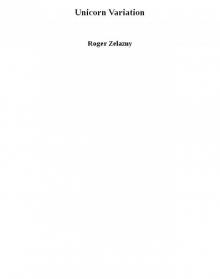 Unicorn Variation
Unicorn Variation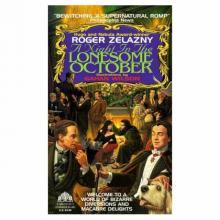 A Night in the Lonesome October
A Night in the Lonesome October Madwand
Madwand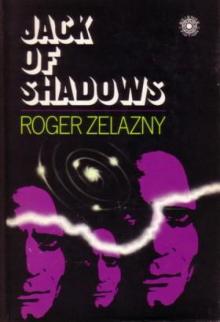 Jack Of Shadows
Jack Of Shadows Lord of Light
Lord of Light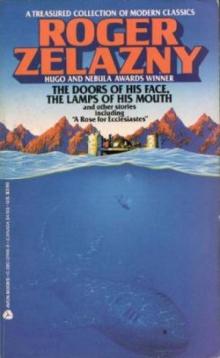 The Doors of His Face, The Lamps of His Mouth and Other Stories
The Doors of His Face, The Lamps of His Mouth and Other Stories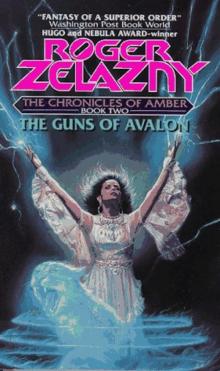 Guns Of Avalon tcoa-2
Guns Of Avalon tcoa-2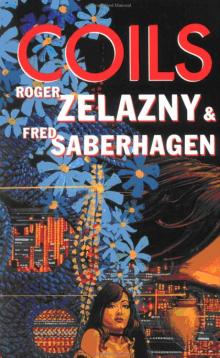 Coils
Coils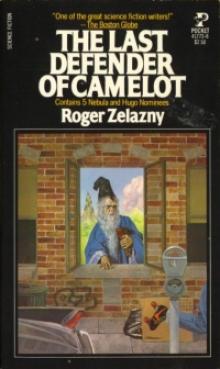 The Last Defender Of Camelot
The Last Defender Of Camelot Creatures of Light and Darkness
Creatures of Light and Darkness This Immortal
This Immortal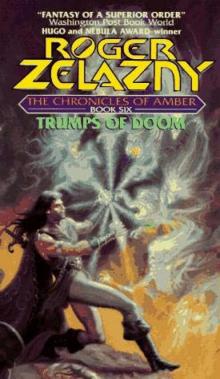 Trumps of doom tcoa-6
Trumps of doom tcoa-6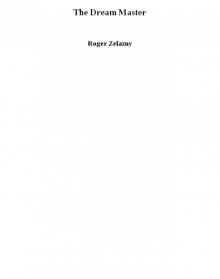 The Dream Master
The Dream Master The Complete Dilvish, The Damned
The Complete Dilvish, The Damned Nine Princes in Amber
Nine Princes in Amber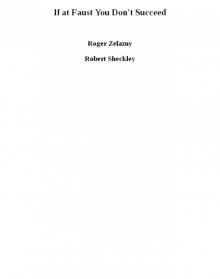 If at Faust You Don't Succeed
If at Faust You Don't Succeed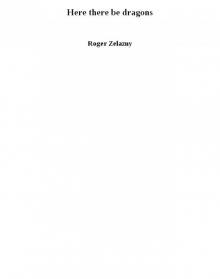 Here there be dragons
Here there be dragons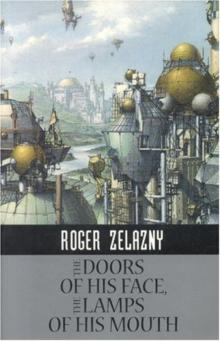 The Doors Of His Face, The Lamps Of His Mouth
The Doors Of His Face, The Lamps Of His Mouth The Great Book of Amber - Chronicles 1-10
The Great Book of Amber - Chronicles 1-10 Madwand (Illustrated)
Madwand (Illustrated) The Chronicles of Amber
The Chronicles of Amber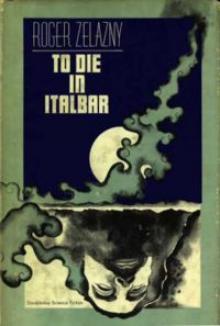 To Die In Italbar
To Die In Italbar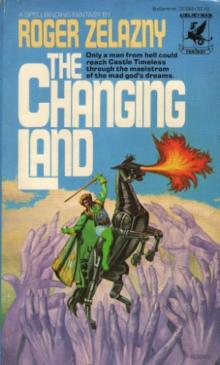 The Changing Land
The Changing Land The Furies
The Furies Nine Princes In Amber tcoa-1
Nine Princes In Amber tcoa-1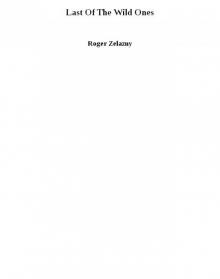 Last Of The Wild Ones
Last Of The Wild Ones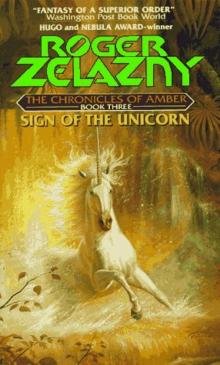 Sign of the Unicorn tcoa-3
Sign of the Unicorn tcoa-3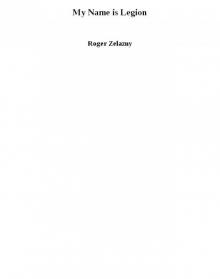 My Name is Legion
My Name is Legion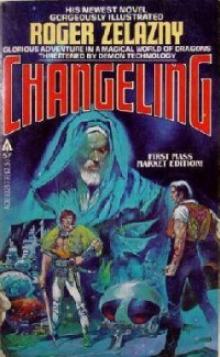 Wizard World 1: Changeling
Wizard World 1: Changeling Changeling
Changeling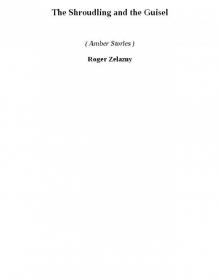 The Shroudling and the Guisel (amber stories)
The Shroudling and the Guisel (amber stories) The Mask of Loki
The Mask of Loki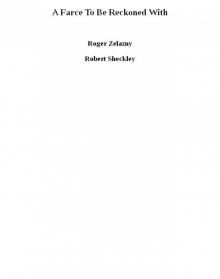 A Farce To Be Reckoned With
A Farce To Be Reckoned With Roadmarks
Roadmarks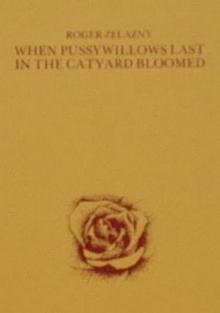 When Pussywillows Last in the Catyard Bloomed (rtf)
When Pussywillows Last in the Catyard Bloomed (rtf)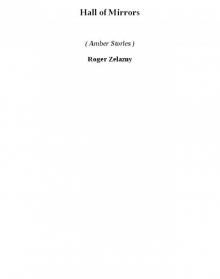 Hall of Mirrors (amber stories)
Hall of Mirrors (amber stories)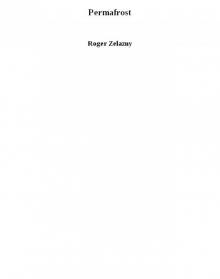 Permafrost
Permafrost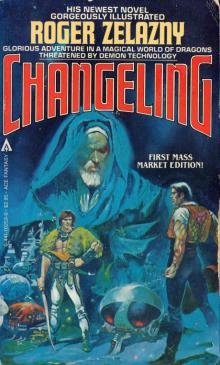 Changeling (Illustrated)
Changeling (Illustrated)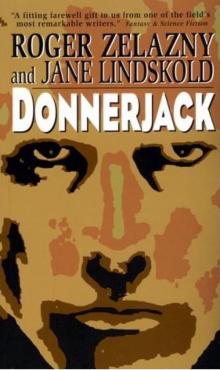 Donnerjack
Donnerjack Shadows & Reflections: A Roger Zelazny Tribute Anthology
Shadows & Reflections: A Roger Zelazny Tribute Anthology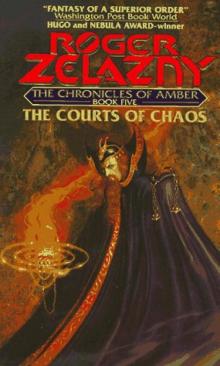 The Courts Of Chaos tcoa-5
The Courts Of Chaos tcoa-5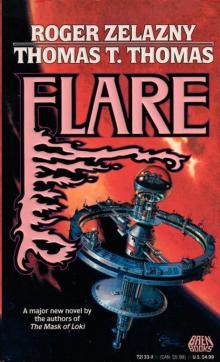 Flare
Flare Doorsways in the Sand
Doorsways in the Sand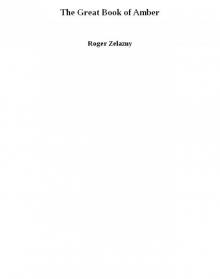 The Great Book of Amber
The Great Book of Amber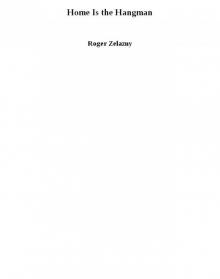 Home Is the Hangman
Home Is the Hangman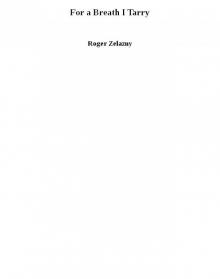 For a Breath I Tarry
For a Breath I Tarry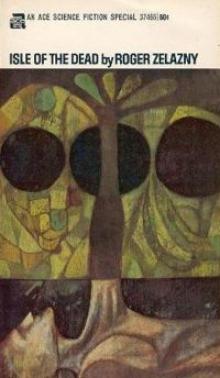 Isle Of The Dead
Isle Of The Dead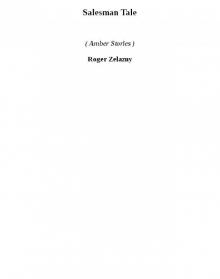 Salesman Tale (amber stories)
Salesman Tale (amber stories) Dismal Light
Dismal Light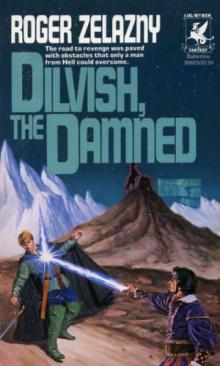 Dilvish, The Damned
Dilvish, The Damned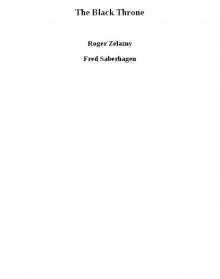 The Black Throne
The Black Throne Wizard World 2: Madwand
Wizard World 2: Madwand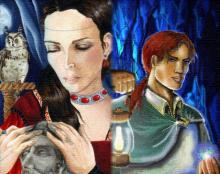 The Salesman's Tale
The Salesman's Tale